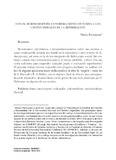Mostrar el registro sencillo del ítem
Con el debido respeto. Consideraciones en torno a los límites morales de la reprobación
| dc.rights.license | http://creativecommons.org/licenses/by-nc-sa/3.0/ve/ | es_VE |
| dc.contributor.author | Parmigiani, Matías | |
| dc.date.accessioned | 2022-11-28T13:47:53Z | |
| dc.date.available | 2022-11-28T13:47:53Z | |
| dc.date.issued | 2022-11-28 | |
| dc.identifier.issn | 1316-7839 | |
| dc.identifier.uri | http://www.saber.ula.ve/handle/123456789/48649 | |
| dc.description.abstract | Pronunciarse reprobatoria o desaprobatoriamente sobre una persona o grupo social puede generar una herida en la autoestima o auto-respeto de dicha persona, así como en la de los integrantes de dicho grupo social. Sin embargo, cuando esta consecuencia parece al menos probable, ¿ofrece ella una razón suficiente para suspender cualquier juicio o evaluación reprobatoria? El presente trabajo intenta responder esta pregunta mediante un análisis crítico de algunas aproximaciones tradicionales a la idea de ‘respeto’, como las de S. Darwall o R. S. Dillon, con el objetivo final de ofrecer una conceptualización alternativa, deudora hasta cierto punto de una tesis planteada por J. Habermas en algunos de sus escritos. | es_VE |
| dc.language.iso | es | es_VE |
| dc.publisher | SaberULA | es_VE |
| dc.rights | info:eu-repo/semantics/openAccess | es_VE |
| dc.subject | Auto-respeto | es_VE |
| dc.subject | Evaluación | es_VE |
| dc.subject | Universalismo | es_VE |
| dc.subject | Particularismo | es_VE |
| dc.subject | Darwall | es_VE |
| dc.title | Con el debido respeto. Consideraciones en torno a los límites morales de la reprobación | es_VE |
| dc.title.alternative | With all due respect.Considerations around the moral limits of disapproval | es_VE |
| dc.type | info:eu-repo/semantics/article | es_VE |
| dcterms.dateAccepted | 10/11/2022 | |
| dcterms.dateSubmitted | 28/10/2022 | |
| dc.description.abstract1 | When someone expresses herself by disapproving a person or social group, she can negatively affect the self-esteem or self-respect of the disapproved person, as well as that of the social group’s members. However, when this consequence seems at least likely, does it offer a sufficient reason to suspend any disapproving judgment or evaluation? The present paper aims to answer this question by critically assessing some traditional approaches to the idea of 'respect', like S. Darwall’s or R. S. Dillon’s. In the end, its goal will be to offer an alternative conceptualization of the idea, based at some point on a thesis defended by J. Habermas in some of his writings. | es_VE |
| dc.description.colacion | 197-226 | es_VE |
| dc.description.email | matias_parmigiani@yahoo.com.ar | es_VE |
| dc.description.frecuencia | Anual | |
| dc.description.paginaweb | http://www.saber.ula.ve/dikaiosyne | |
| dc.identifier.depositolegal | pp-199802ME321 | |
| dc.publisher.pais | Venezuela | es_VE |
| dc.subject.institucion | Universidad de Los Andes | es_VE |
| dc.subject.keywords | Self-respect | es_VE |
| dc.subject.keywords | Evaluation | es_VE |
| dc.subject.keywords | Universalism | es_VE |
| dc.subject.keywords | Particularism | es_VE |
| dc.subject.keywords | Darwall | es_VE |
| dc.subject.seccion | Dikaiosyne: Artículos | es_VE |
| dc.subject.tipo | Artículos | es_VE |
| dc.type.media | Texto | es_VE |
Ficheros en el ítem
Este ítem aparece en la(s) siguiente(s) colección(ones)
-
Dikaiosyne - Nº 38 Año XXIV
enero - diciembre 2022


